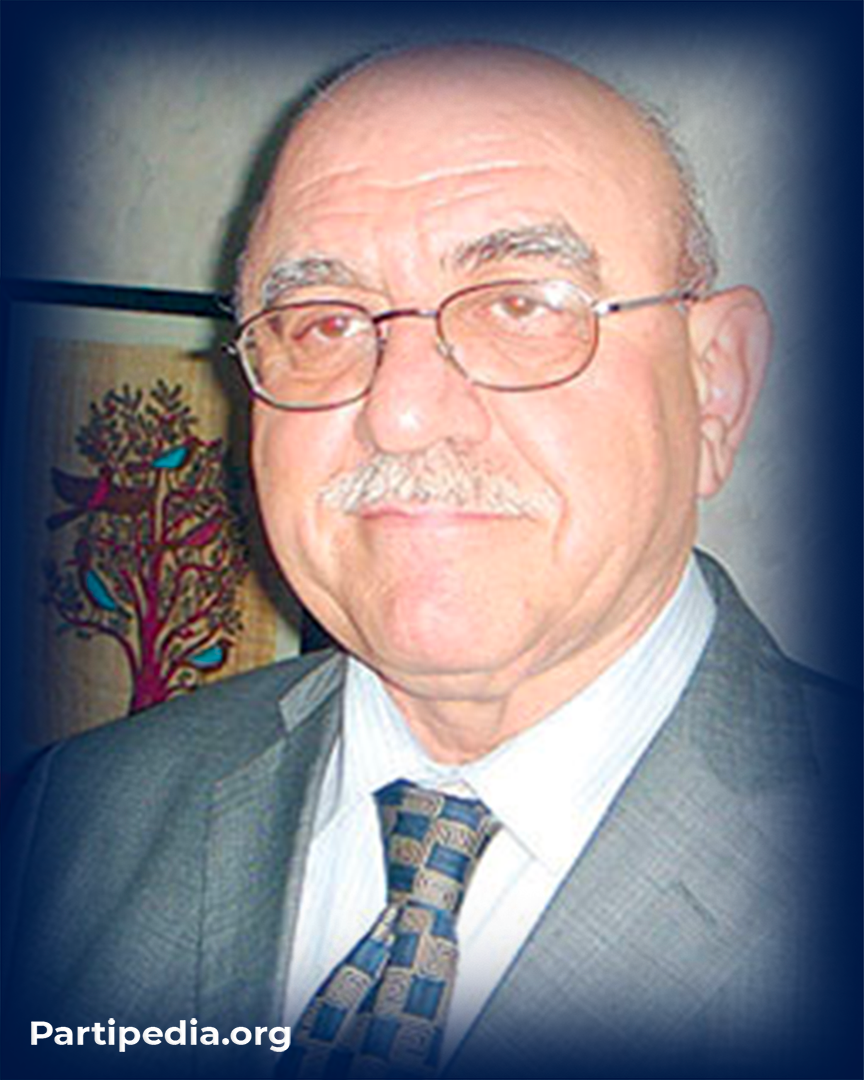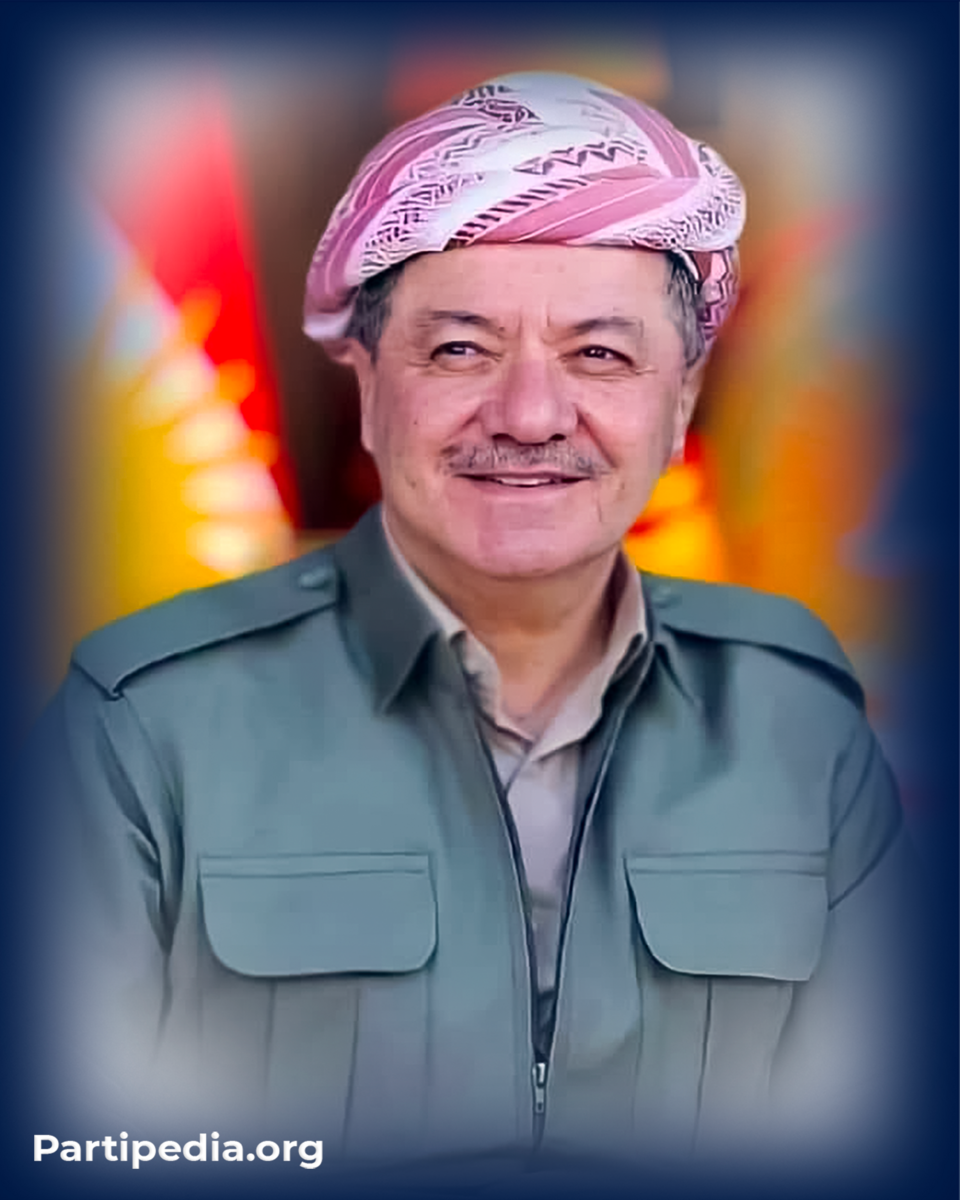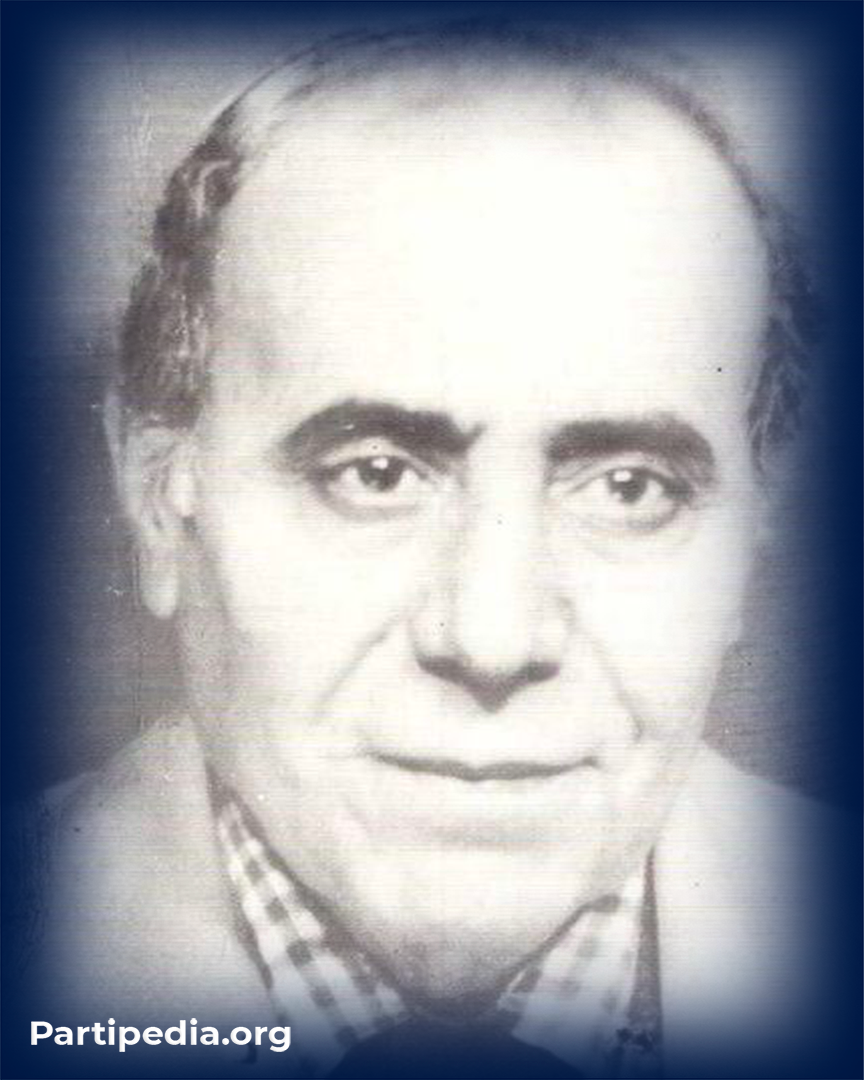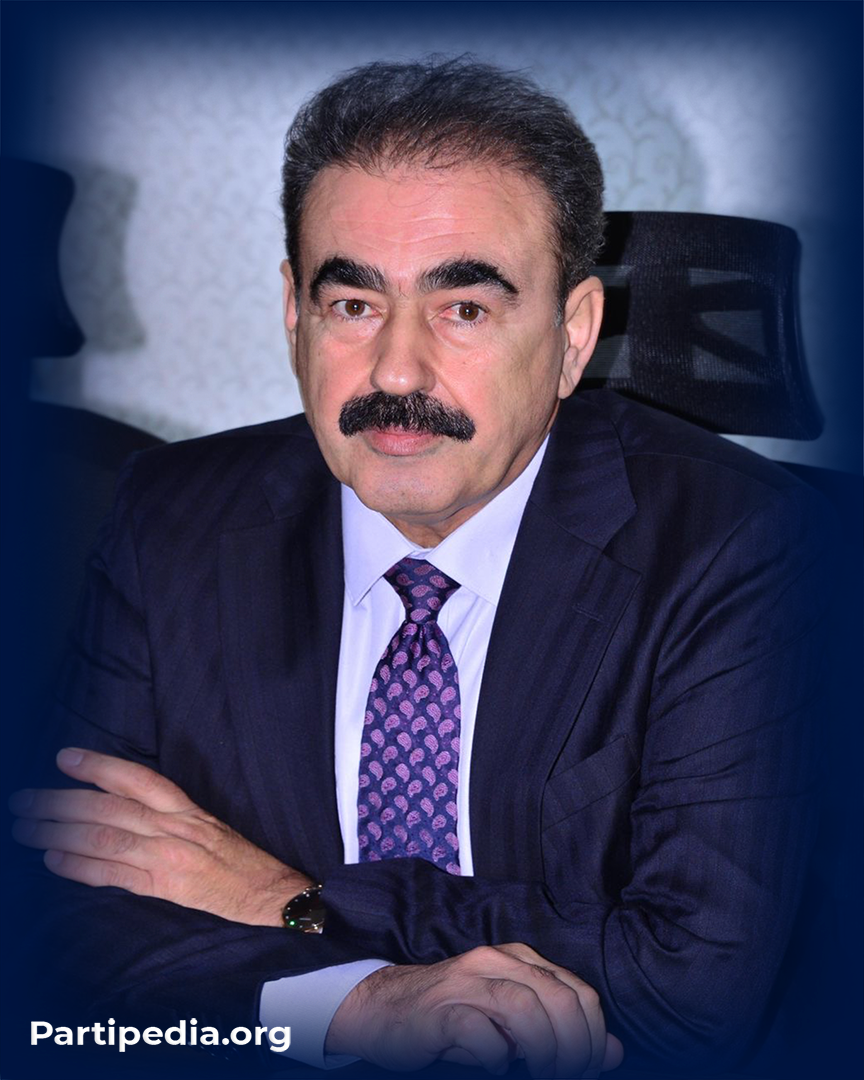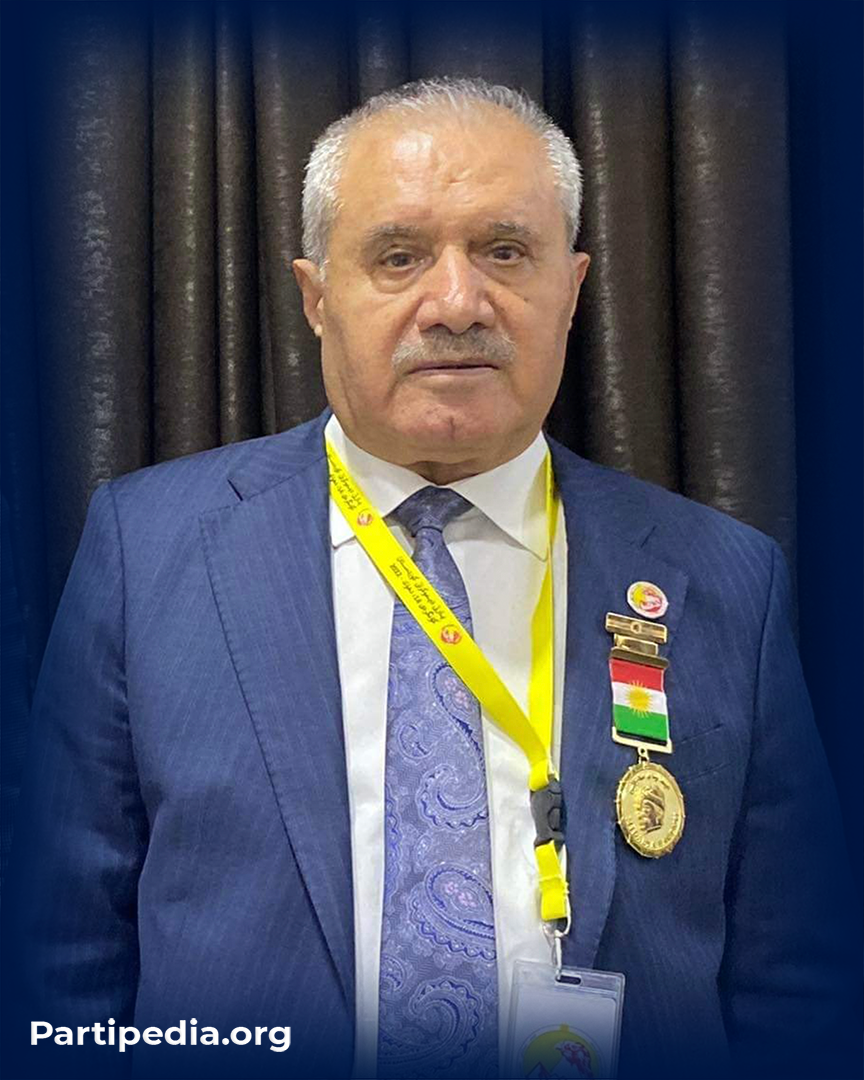Jawhar Namiq Salim Ismail joined the ranks of the Kurdistan Democratic Party (KDP) in 1964. In 1976, he was elected as a member of the interim leadership of KDP at the Berlin Conference. In 1989, he was elected as a member of the Central Committee of KDP at the 10th Congress. On June 4, 1992, he was elected as the first speaker of the Kurdistan National Assembly in the first term. In 2003, he resigned as Secretary of the Political Bureau of KDP.
Biography
Jawhar Namiq Salim Ismail, also known as Salim, Salim Sorani, Salim Qayada, Fuad, and Che Guevara, was born in 1945 in the Garmin region. He started his primary education in 1956 in Khanaqin town, the center of the Garmaser region. In 1958, his family moved to Baghdad. In 1964, he completed his secondary education in Baghdad. In 1964, he was appointed as an employee in the Secretariat of the Capital in front of Karkhi in Baghdad. In 1968, he was transferred to the Office of Warehouses and Fuels. In 1968, he graduated from high school in Baghdad. In 1968, he entered the College of Management and Economics, Department of Economics, University of Mustansiriyah in Baghdad. In 1972, he received his bachelor's degree from the same university.
In 1975, after the collapse of the September Revolution, he was displaced to Iran. He moved to Sweden as a refugee in February. From 1980 to 1981, he finished a Swedish language course. In March 1992, he married Engineer Nargis Osman Habib. On February 15, 2011, he went to Sweden for treatment and was diagnosed with liver cancer at Karolinska Hospital. He died on Tuesday morning, March 22, 2011, in the Kingdom of Sweden. On March 24, 2011, his body was returned home via Erbil airport and was welcomed by President Massoud Barzani. He was buried on March 25, 2011, in his hometown of Barlut village in the Garmian region. He was an expert in painting and carving on boards. He was a poet, a good singer, and an expert in Kurdish maqams. He was fluent in Kurdish, Arabic, Swedish, Persian, and English.
Jawher’s Striving Record
In 1964, Salim joined the ranks of KDP. In 1968, he was a member of the committee of the Blesa Organization to organize KDP students at universities and colleges in Baghdad. He also supervised the organization KDP students at Mustansiriyah University who took the evening classes. In 1972, he joined the Peshmerga forces at the request of the KDP Political Bureau. In 1972, he was the assistant director of the KDP Political Bureau in Nawprdani village of Erbil province. In 1973, he worked in the media department of KDP. In 1973, he was appointed to the executive committee of the third branch of KDP. He was appointed head of the security department. In 1973, he was a teacher of social change and progress in the fourth course of the KDP cadre training school in Nawprdani village of Erbil province.
In early April 1975, he was appointed by Massoud Barzani to prepare for the May Revolution. In late April 1975, he was invited by Massoud Barzani, along with four others, to attend the first meeting of the interim leadership of KDP outside the village of Naghdeh in East Kurdistan in order to continue the defense and resistance. In the autumn of 1975, under the leadership of Massoud Barzani, Jawhar Namiq along with Arif Taifur, Mohammad Reza, and lawyer Karim Sultan, also known as Karim Sinjar, planned the May Revolution in Tehran. In 1975, after being exposed by the Iranian SAVAK (Information and Security Organization of the Country), he smuggled to North Kurdistan with Karim Sinjar in order to continue his struggle. Later, he reached South Kurdistan with the help of Kurdish lovers and the Kurdistan Democratic Party (KDP)-Turkey. He was known as Salim, Salim Sorani, and Salim Qayada among the Peshmergas of the KDP interim leadership. He also used the name "Fuad" when writing letters to Massoud Barzani, and the Peshmergas of the interim leadership of the KDP called him "Kurdish Che Guevara".
In 1976, he was elected as a member of the interim leadership of the KDP at the Berlin Conference. In 1976, he was appointed as the head of the KDP in Badinan region. On November 15, 1977, he participated in the meeting of the interim leadership of the KDP to reorganize the Peshmerga forces and revive the organizations. In 1979 he left KDP.
In 1981, once again, he joined the Kurdistan People's Democratic Party (KDP). On July 26-30, 1981, he participated in the first congress of the KDP and was elected a member of the central committee, but he later withdrew from the party. After returning to the ranks of the KDP in 1989, he was elected as a member of the Central Committee of the KDP in the 10th Congress. In 1989, he returned to Sweden for further treatment after breaking his leg. On December 13, 1990, he was appointed as the head of the central organization department of the KDP. In 1991, he gave a seminar on negotiation and autonomy to the students of the ninth course of the KDP Cadres Institute in Pirmami village of Erbil province. On April 7, 1992, he participated in the Kurdistan Front's meeting in Pirmam as a representative of the KDP in order to prepare for the Kurdistan National Assembly elections. On June 4, 1992, he was elected as a member of the Kurdistan National Assembly in the first term on the KDP list. On June 4, 1992, he was elected as the first speaker of the Kurdistan National Assembly in the first term. On Wednesday, September 2, 1992, he published an article in the newspaper Khabat, the KDP. On August 20, 1992, he participated in the first congress of the Kurdistan Unity Party in Erbil as the chairman of the Kurdistan National Assembly. In 1993, he received an official license from the Ministry of Culture of the Kurdistan Regional Government (KRG) as the owner of the Biryati newspaper, the organ of the KDP. On Thursday, July 1, 1993, he attended the graduation ceremony of Salahaddin University in Erbil. In 1993, he was elected as a member of the Political Bureau of the KDP in the 11th Congress. In December 1993, he was appointed as the first head of the Central Bureau of Studies and Research of the KDP. He published 35 books and pamphlets in various languages. In 1994, he taught parliamentary lessons to students of advanced short courses in Pirmam village.
On May 4, 1994, the KDP and the Patriotic Union of (PUK) signed a ceasefire agreement. On Monday, October 25, 1994, he attended a joint meeting of the committee to normalize the tense situation in Sulaimani-Kirkuk provinces in the Qalachualan town of Sulaimani province. On Monday, December 18, 1994, he attended a meeting of the Sulaimani Provincial Normalization Committee in Qalachualan. From December 23, 1994, to March 28, 1995, he protested in the Kurdistan National Assembly with 58 members of the Kurdistan National Assembly from all lists to condemn the civil war. On December 30, 1994, his house in Erbil was looted by PUK fighters.
On August 9-11, 1995, he was a member of the KDP delegation to the Dublin (Ireland) meeting for a peace agreement with the PUK. On October 2, 1995, he visited Tehran as a member of a delegation of the KDP at the invitation of the authorities of the Islamic Republic of Iran. On October 4, 1995, he was a member of a delegation of the KDP that visited Sayyid Mohammad Baqir Hakim (1939-2003), the chairman of the Supreme Council of the Islamic Revolution in Iraq. On February 25-27, 1997, he headed a delegation of the Kurdistan Democratic Party (KDP)-United to meet with officials of the Foreign Ministry of the Arab Republic of Egypt, who met with Egyptian President Mohammed Hosni Mubarak. On March 1, 1997, he led a delegation of the KDP to meet with Abdullah al-Ahmar, deputy secretary general of the Ba'athist Arab Socialist Party. A day later, they met with Syrian Arab People's Council Chairman Abdul Qadir Qaddura.
On Monday, July 7, 1997, he accompanied President Massoud Barzani as the Speaker of the Kurdistan National Assembly and participated in the graduation ceremony of the 16th round of Salahaddin University in Erbil. On July 25, 1997, he participated in the opening ceremony of the first congress of the Kurdish Failis Association in Erbil as the chairman of the Kurdistan National Assembly. In 1997, he became the owner of the sports newspaper Brayati. In May 1998, he delivered a speech at the Cairo Congress of Arab-Kurdish Dialogue.
In mid-May 1998, he visited the headquarters of the Swedish Social Democratic Party, the Swedish Parliament, and the Swedish Foreign Ministry. On May 29, 1998, he participated in the opening of the fifth Congress of the Kurdistan Democratic Youth Union (KDU) in Erbil as the chairman of the Kurdistan National Assembly. In 1998, he was the owner of the Brayati Sport magazine. In 1999, he was elected as a member of the Central Committee of the KDP in the 12th Congress. In 1999, he was elected as a member of the Political Bureau of the KDP at the first meeting of the Central Committee.
On Friday, December 8, 1999, President Massoud Barzani received lawyer Jalal Hisamuddin Nuruddin (1933-2017), also known as Jalal Talabani, and his accompanying delegation. On December 21, 1999, he submitted his resignation letter as speaker of the Kurdistan National Assembly in the first term. On Monday, February 21, 2000, accompanied by Engineer Mohammed Mahmoud Abdulrahman (1933-2004) known as Sami Abdulrahman, he participated in a meeting of the Joint High Committee for Peace in Shaqlawa town of Erbil province between the KDP and the PUK.
On March 14, 2000, he participated in the graduation ceremony of the first course (Martyr Idris Barzani Course) of the Police College in Erbil as the Secretary of the Political Bureau of the KDP. On December 2, 2000, he was elected as the Secretary of the Political Bureau of the KDP. On December 6, 2000, as Secretary of the Political Bureau of the KDP, he accompanied President Massoud Barzani to the opening of the headquarters of the September High Institute in Shaqlawa, Erbil province. On Monday, December 8, 2001, in Pirmam, Erbil province, accompanied by President Massoud Barzani, he received Jalal Talabani, who was planning to visit the Republic of Turkey. On Tuesday, December 30, 2001, he participated in the opening ceremony of the second congress of the Kurdistan Union of Journalists in Erbil as the Secretary of the Political Bureau of the KDP. On April 3-5, 2001, he represented President Massoud Barzani in the first academic congress on Kirkuk in Erbil Cultural Hall and delivered a speech. On April 23, 2001, he accompanied President Massoud Barzani to the opening of the fourth Congress of the Union of Islamic Scholars of Kurdistan in Erbil.
On Wednesday, April 11, 2001, accompanied by Sami Abdulrahman, as a member of the High Peace Committee of the KDP, he met with the High Peace Committee of the PUK in Sulaimani. On June 10, 2001, he received a delegation of the Kurdistan Communist Party led by Karim Ahmad, accompanied by President Massoud Barzani. On Thursday, December 11, 2001, he welcomed Jalal Talabani, accompanied by President Massoud Barzani, on his return from a visit to Turkey.
On Sunday, March 4, 2001, he was received by Jalal Talabani in Sulaimani. On Wednesday, April 11, 2001, he visited the Political Bureau of the PUK as a member of the delegation of the High Peace Committee to discuss UN assistance for the return of civil war refugees and the release of prisoners. On Thursday, April 12, 2001, he met with Jalal Talabani in Sulaimani. On Monday, April 23, 2001, he received Dr. Barham Salih, the head of the Sulaimani administration, accompanied by President Massoud Barzani to discuss the joint visit of the KDP and the PUK delegation to the United States. On Sunday, April 29, 2001, he received the High Coordination Committee of the PUK in Pirmam. On Wednesday, June 20, 2001, the KDP High Peace Committee met with the PUK Peace Committee in Sulaimani. On Sunday, July 1, 2001, he received a delegation from the High Peace Committee of the PUK in Pirmam in order to coordinate the return of civil war refugees to their homeland. On Monday, July 9, 2001, the KDP High Peace Committee met with the PUK Peace Committee at the Ashti Hotel in Sulaimani. On Sunday, July 15, 2001, the KDP Peace Committee chairman received the PUK High Peace Committee in Pirmam and discussed the electricity and financial issues.
On July 28, 2001, he accompanied President Massoud Barzani to the opening of the 10th Congress of the Kurdistan Students Union in Erbil Cultural Hall. On Saturday, September 15, 2001, he attended a joint meeting of the Political Bureau of the KDP and the PUK in Pirmam village under the chairmanship of President Massoud Barzani to discuss the situation in the world after 9/11. On Tuesday, October 16, 2001, he accompanied a delegation led by the KDP High Peace Committee and met with the PUK High Peace Committee in Sulaimani. On Sunday, July 22, 2001, he accompanied the KDP High Peace Committee and met with PUK High Peace Committee in Koya. On Wednesday, August 1, 2001, the KDP High Committee met with the PUK High Peace Committee in Koya. On Wednesday, September 5, 2001, the KDP High Peace Committee met with the PUK High Peace Committee in Koya. On Thursday, November 1, 2001, he met with a delegation of the PUK Political Bureau at the headquarters of the KDPPolitical Bureau in Pirmam village. On Monday, November 12, 2001, he led a delegation of the KDP to a joint meeting of the Political Bureau of the KDP and the PUK to discuss the events of 9/11 and their impact on the Middle East. On Tuesday, June 19, 2001, he received a delegation from the Kurdish National Congress (KNC) in the United States at the headquarters of the KDPPolitical Bureau in the presence of Ramzi Shaban.
On July 4, 2001, he accompanied President Massoud Barzani to the graduation ceremony of the 12th course of the KDP cadre Training Institute in Erbil. On July 27, 2001, he accompanied President Massoud Barzani to the opening of the 10th Congress of the Kurdistan Students Union in Erbil. On Tuesday, October 2, 2001, the KDP High Peace Committee received the PUK High Peace Committee in Pirmam village. In the meeting, they emphasized the need to eradicate terrorism in the Kurdistan Region. On Saturday, October 27, 2001, he accompanied President Massoud Barzani as Secretary of the Political Bureau of the KDP and participated in the opening of the fifth Congress of the Kurdistan Women's Union in Erbil. On Sunday, November 25, 2001, he attended a joint meeting of the Political Bureau of the KDP and the PUK in Pirmam village. On Tuesday, December 31, 2001, he attended the second congress of the Kurdistan Union of Journalists in Erbil.
In 2001, he gave a seminar on the peace process to the students of the 12th course of the KDPCadres Institute in Erbil. On Thursday, November 29, 2001, he attended the graduation ceremony of the 12th course of the KDP Cadres Institute in Erbil, accompanied by President Massoud Barzani. On Wednesday, December 9, 2002, he participated in the joint meeting of the High Peace Committee between the KDP and the PUK at the headquarters of the Political Bureau of the KDPin Pirmam. On Tuesday, April 9, 2002, he met with the PUK High Peace Committee in Pirmam village as a member of the KDP High Peace Committee.
On December 14-16, 2002, he was elected as a member of the Monitoring Committee of the Iraqi Opposition Congress at the London Congress. On Monday, December 20, 2003, Accompanied by President Massoud Barzani, he received French Senator Emre Dimontescue. On Wednesday, April 2, 2003, he attended a meeting of the joint leadership of the KDP and the PUK in Dukan, accompanied by President Massoud Barzani, in order to prepare for the Iraqi liberation phase. In the spring of 2003, he resigned as secretary of the political bureau of the Kurdistan Democratic Party (KDP).
His Works:
1. Is federalism a political option in Iraq? - 2005.
2. Kurds in the Game of Legal Texts: Review of the Permanent Constitution of Iraq (First Edition, 2007), (Second Edition, 2011).
3. Kurdish Experience in its Pendulum Movement.
Sources:
-
بهرام ولدبیگی، تحقیق آرزوهای ملت كرد، روزنامه آشتی، شماره ٢٨، سال دوم، تهران، دوشنبه، ٢ خرداد ١٣٨٤ھ . ش، ص ص ١، ٣.
-
بوار نوورهدین، كورد و كوردستان بیبلیۆگرافیا و پێڕستیان له كتێبی كوردیدا، بهرگی دووهم بهشی سێیهم، (تاران ـ چاپخانهی تاران ـ ٢٠١٦ز)، ل ل ١٦، ٣٤٣.
-
تاریق كارێزی، جەوهەر نامیق سالم ١٩٤٥ ـ ٢٠١١، عومهر عهلی شهریف، ١٠٠ ناوداری كهركووك و گهرمیان، (سلێمانی ـ چاپخانهی كارۆ ـ ٢٠١٩ز)، ل ل ٨٢ ـ ٨٧.
-
جهوههر نامق سالم، كورد له گهمهی دهقه یاساییهكاندا، بهرگی دووهم، چاپی دووهم، (ههولێر ـ دهزگای چاپ و بڵاوكردنهوهی ئاراس ـ ٢٠١١ز)، ل ل ١ ـ ٥٤٨.
-
جەوهەر نامیق سالم، ئهزمونی كوردی له بزاڤه پهندولییهكهیدا، بهرگی سێیهم، (ههولێر ـ دهزگای چاپ و بڵاوكردنهوهی ئاراس ــ چاپخانهی ئاراس ـ ٢٠١١ز)، ل ل ١ ـ ٥٥٢.
-
جوهر نامق سالم، ڕۆڵی بهرهی كوردستانی له قۆناغی پاش ههڵبژاردن دا، ڕۆژنامهی خهبات، ئۆرگانی پارتی دیموکراتی کوردستان، ژماره ٦٣٦، چوارشهمه، ٢ی ئهیلولی ١٩٩٢ز، ل ٢.
-
حبیب محمد كریم، تأریخ الحزب الدیمقراطي الكوردستاني ـ العراق (في محطات رئیسیة) ١٩٤٦ ـ ١٩٩٣، (دهوك ـ مطبعة خهبات ـ ١٩٩٨م)، ص ص ١٤٧، ١٥٢، ١٧٤، ١٨٢.
-
حسن لطیف الزبیدي، موسوعة الأحزاب العراقیة، (بیروت ـ مؤسسة العارف للمطبوعات ـ ٢٠٠٧م)، ص ص ٣٤١، ٥٥٥.
-
سامي شورش، كردستان والأكراد، الطبعة الثانیة، (أربیل ـ مطبعة روژههلات ـ ٢٠١٩م)، ص ١٤٥.
-
سلێمان مستهفا حهسهن، كورد و یهكهم ئهزمون، (ههولێر ـ چاپخانهی كارۆ ـ ٢٠١٧ز)، ل ل ٣١، ٣٣، ٧٥، ٨٠، ٢٧١.
-
سید علی موجانی، سولماز صدقی، الهه نعمتی ...، فرهنگ رجال و خاندانهای معاصر عراق، (تهران ـ نشر عظام ـ ١٣٩٢ھ . ش)، ص ٣٤٢.
-
شهعبان عهلی شهعبان، ههندیك زانیاری سیاسی و مێژوویی، چاپی سێیهم، (ههولێر ـ چاپخانهی ڕۆژههڵات ـ ٢٠١٣ز)، ل ل ١٢٦، ١٤٧ ـ ١٤٨.
-
شوان حسێن شینك باڵهكی، جهوههر نامق سالم ١٩٤٦ ـ ٢٠١١ ژیان و بهرههم و ڕۆڵی سیاسی، زانكۆی سۆران فاكهڵتی ئاداب، ٢٠١٦ز، (ماستهرنامهی بڵاونهكراوه)، ل ل ٧، ١٠ ـ ١٣، ١٥ ـ ١٩، ٢٢، ٢٤، ٢٦، ٢٩ ـ ٣٠، ٣٦ ـ ٣٩، ٤١، ٤٤ ـ ٤٥، ٤٨، ٥١، ٥٥ ـ ٥٦، ٥٨، ٧٢، ٨٠، ٨٥، ٨٩، ١١٠، ١١٤ ـ ١١٥، ١٢٧، ١٣٠، ١٤٥ ـ ١٤٦، ١٥٢.
-
عدنان المفتي، الحوار العربي الكردي، (القاهرة ـ مكتبة مدبولي ـ ١٩٩٩م)، ص ١٧٤.
-
علي سنجاري، القضیة الكوردیة وحزب البعث العربي الاشتراكي في العراق، الجزء الثالث، (دهوك ـ مطبعة خاني ـ ٢٠١٢م)، ص ص ١٦٨ ـ ١٧٠.
-
عمار عباس محمود، القضیة الكردیة اشكالیة بناء الدولة، (القاهرة ـ العربي للنشر و التوزیع ـ ٢٠١٦م)، ص ٧٩.
-
فهرهاد عهون، ئهزموونی ڕۆژنامهوانیم، (ههولێر ـ چاپخانهی ڕۆژههڵات ـ ٢٠١١ز)، ل ل ٩٠، ٢٠٧.
-
كاروان مهحوی، كۆنگرهكانی پارتیمان پارتی دیموکراتی کوردستان، گۆڤاری شرۆڤه، مهكتهبی ناوهندی دیراسات و توێژینهوه، ژماره ١٤، ههولێر، چاپخانهی حاجی هاشم، پاییزی ٢٠١٠ز، ل ٢٠.
-
محهمهد مهلا قادر، خهباتنامه كورته مێژووی پارتی و كولتووری بارزانی نهمر، چاپی دووهم، (ههولێر ـ دهزگای چاپ و بڵاوكردنهوهی ئاراس ـ ٢٠٠٧ز)، ل ٩٧.
-
محهمهد مهلا قادر، سهربوردهی نهمران، (ههولێر ـ چاپخانهی حاجی هاشم ـ ٢٠١٤ز)، ل ل ٢٣١ ـ ٢٣٦.
-
مهحموود محهمهد، ڕوانین سهرنج و بۆچوون و لێكدانهوه، بهرگی یهكهم، (ههولێر ـ چاپخانهی ڕۆژههڵات ـ ٢٠١٦ز)، ل ٢٤٨.
-
مهلا شێم حهمدی حاجی ئۆمهرانی، سهرهتای شۆڕشی نوێی ساڵی ١٩٧٦ چۆن دهستی پێ كرد؟!، چاپی دووهم، (ههولێر ـ چاپخانهی حاجی هاشم ـ ٢٠١٣ز)، ل ٥٢.
-
مهلا فاروق شوانی، ههموو كورد، بهرگی یهكهم، (ههولێر ـ چاپخانهی ڕۆشنبیری ـ ١٩٩٧ز)، ل ١٠٦.
-
هاوژین حهمهڕهشید و ههندرێن شێرزاد، له كۆنگرهی (١٠)یهمی یهكێتی قوتابیانی كوردستاندا، ڕۆژنامهی برایهتی، ئۆرگانی پارتی دیموکراتی کوردستان، ژماره ٣٤٤٦، ههولێر، یهكشهمه، ٢٩ی تهموزی ٢٠٠١ز، ل ١.
-
ههرێمی كوردستانی عێراق، ئهنجومهنی نیشتمانیی كوردستانی عێراق، ئهنجومهنی نیشتمانیی كوردستانی عێراق پرۆتۆكۆلهكان ـ ١٩٩٩، بهرگی بیست و دووهم، (ههولێر ـ چاپخانهی وهزارهتی پهروهرده ـ ١٩٩٩ز)، ل ل ٧١٥، ٧٢٠.




